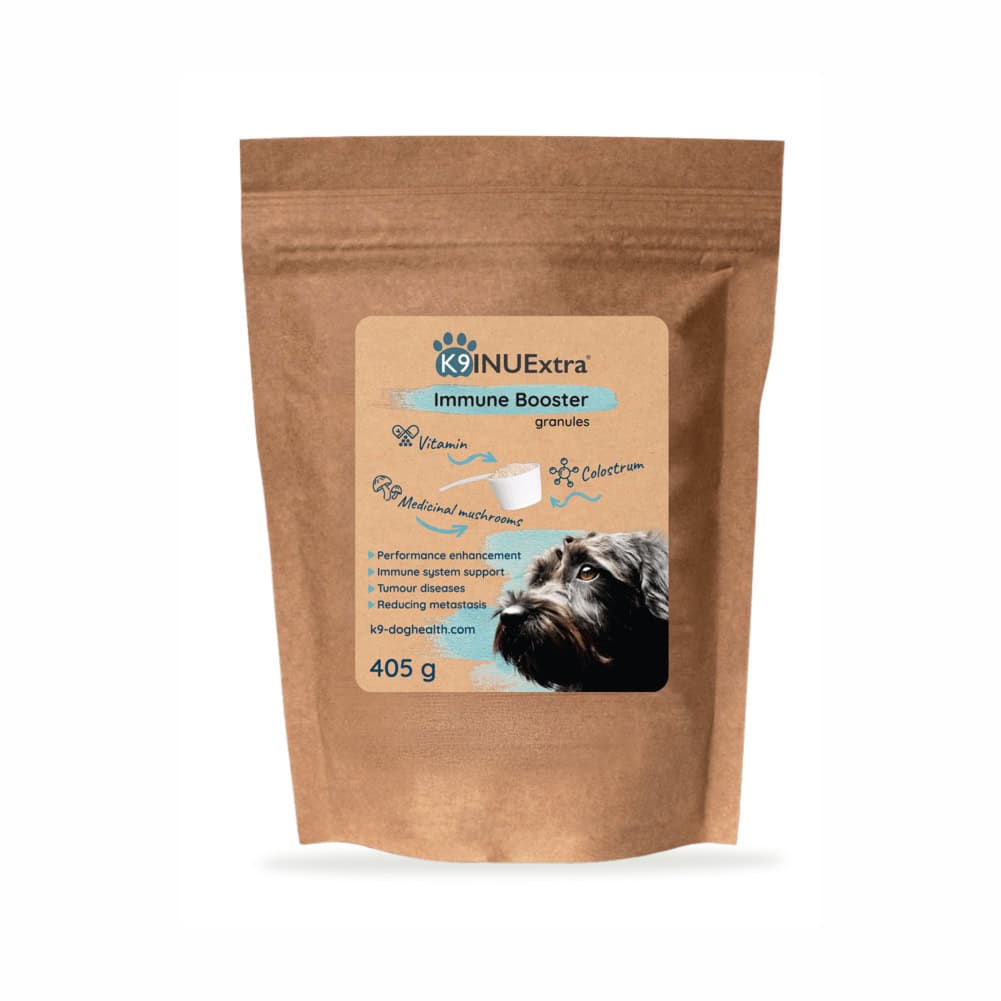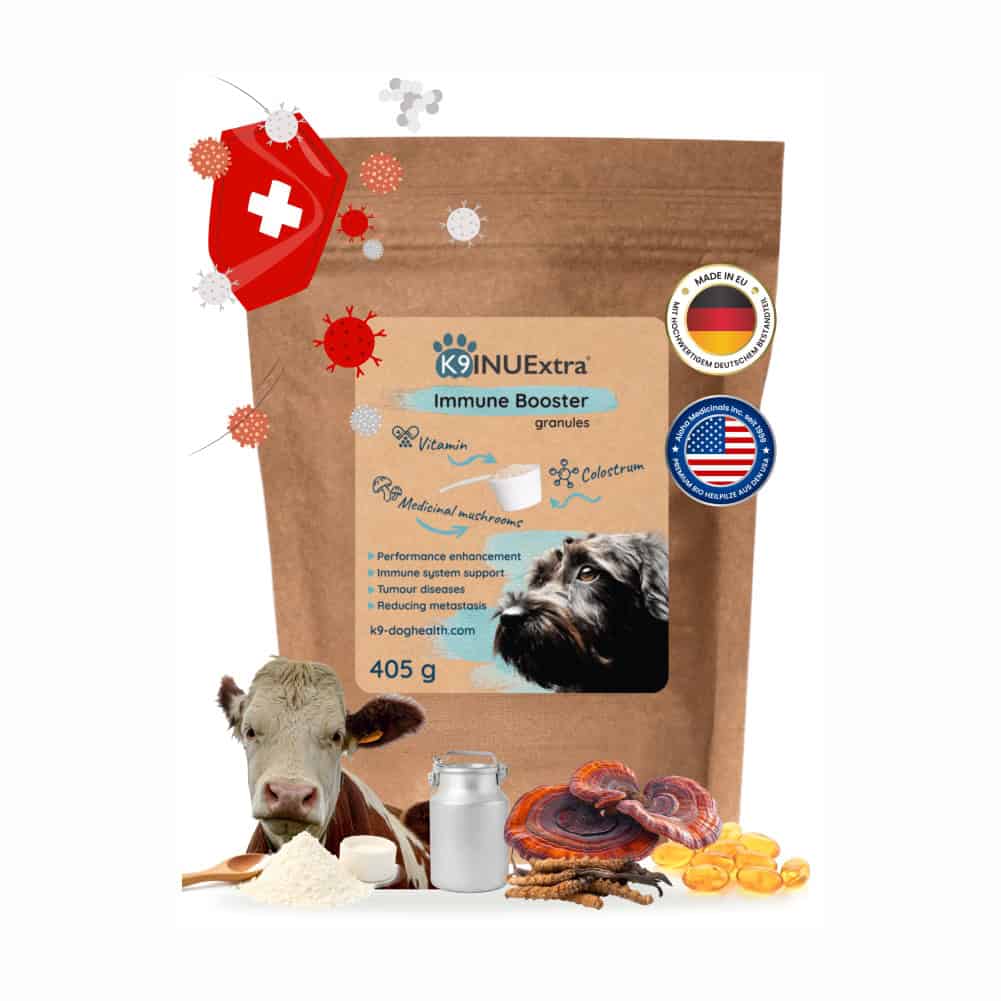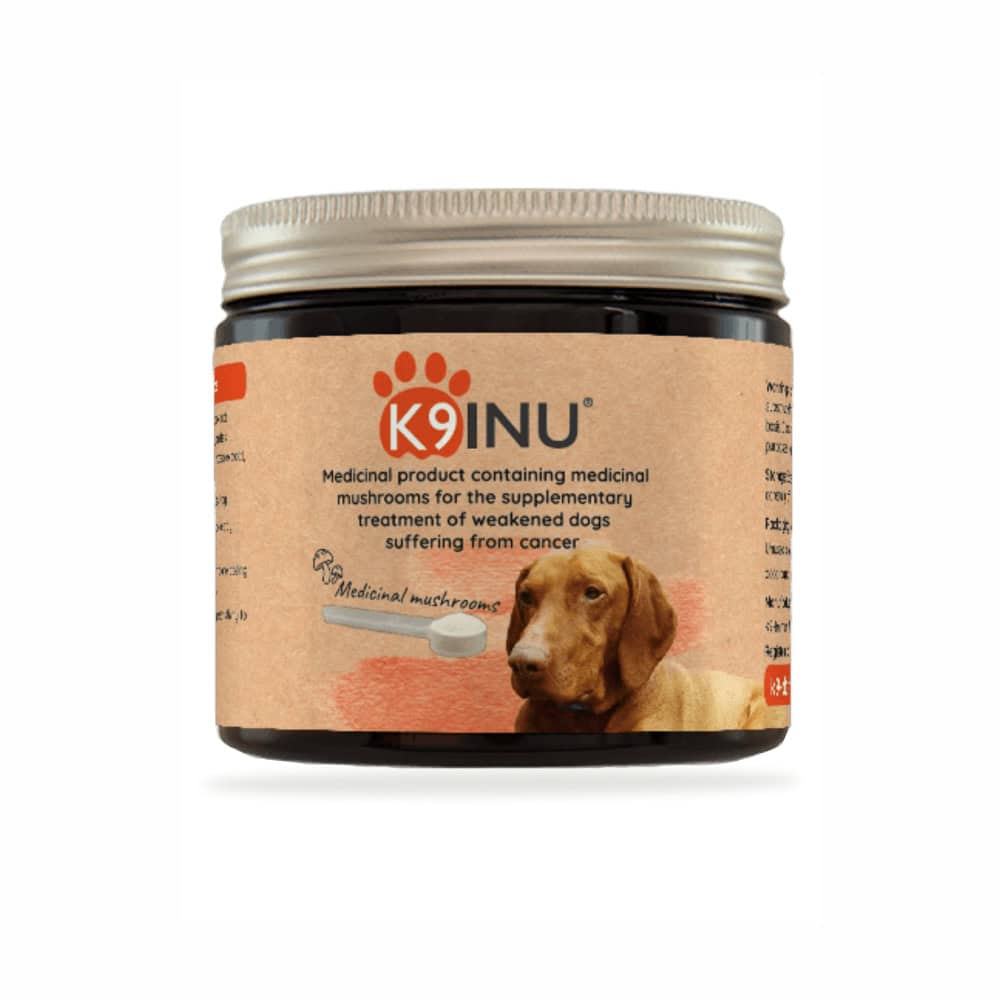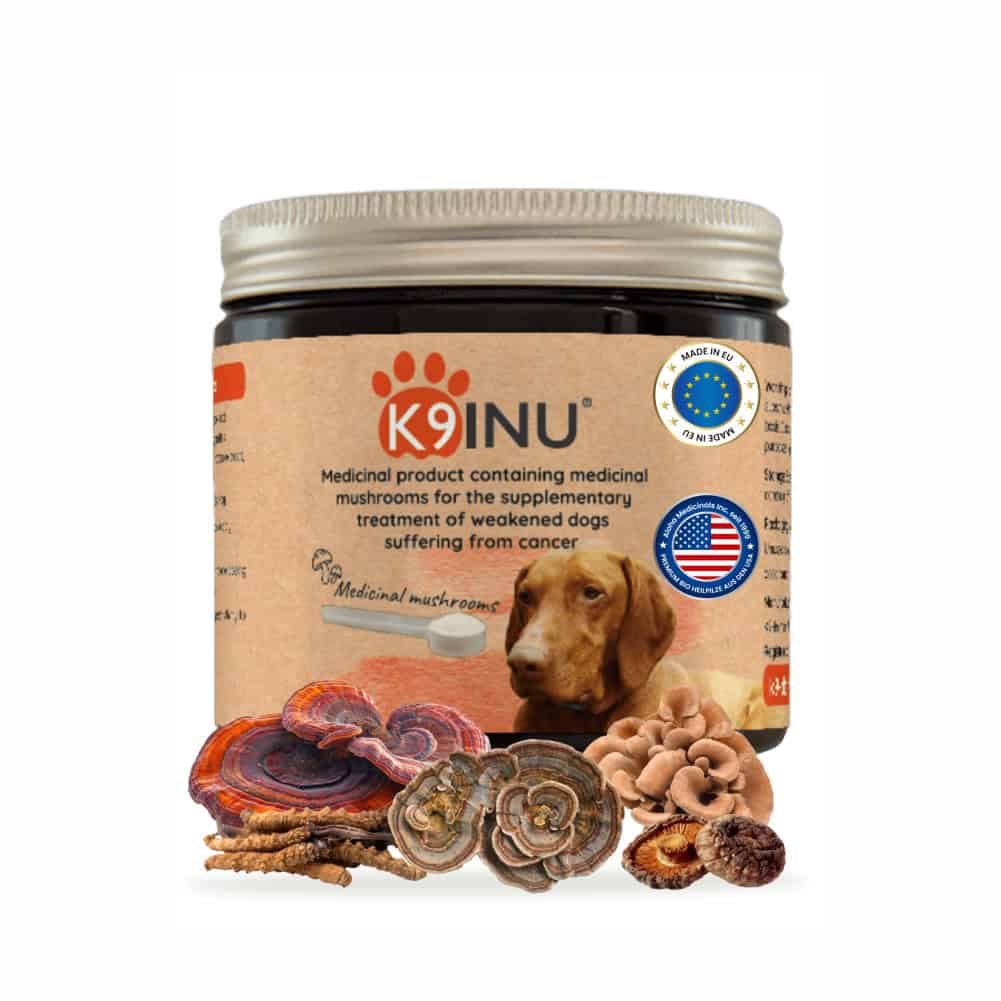Unfortunately, tumors are also common in dogs. While they occur most frequently in older animals, younger dogs are not spared either. Inadequate nutrition, improper housing conditions, genetic factors, environmental pollution, and stress can all contribute to the development of tumors. In this article, we have gathered all the important information about the types of dog tumors, their symptoms, and possible treatment methods.
The Basics of Dog Tumors
Tumors are clusters of cells that grow uncontrollably when the balance between cell formation and cell death is disrupted. Tumors are classified into two main categories: benign and malignant.
Benign Tumors
These tumors do not spread to other tissues or organs. Although they may require medical intervention, they are not cancerous and generally do not pose a significant threat to the animal’s life.
Malignant Tumors
These tumors are cancerous and can spread to other organs, forming metastases. Depending on the type and aggressiveness of the tumor, they can pose serious health risks to dogs. Treatment often involves surgical intervention, radiation therapy, chemotherapy, and other medical treatments.
Causes and Risk Factors of Dog Tumor Types
The exact cause of tumor development is not always known. Certain types are more common in specific dog breeds, suggesting a genetic predisposition. Older dogs are also more susceptible to tumors. The following factors also contribute to the development of tumors:
- Environmental pollution, such as exhaust fumes and cigarette smoke
- Chemicals, like pesticides and household cleaners
- Stress and the resulting weakening of the immune system
- Poor quality dog food and treats
- UV radiation
Prevention Tips for Dog Owners
It is crucial that the dog’s diet is of high quality and free from artificial additives. Gluten-containing foods should also be avoided, as they can cause inflammation that may lead to tumor development. It is not enough to only focus on the dog food! Treats should also be low in carbohydrates and free from artificial ingredients, ideally gluten-free, to prevent food intolerances and allergic reactions.
Types and Symptoms of Dog Tumors
There are many types of tumors, and their symptoms vary depending on whether the tumor is malignant or benign and where it is located.
Malignant Dog Tumor Types
Malignant tumors are clusters of cells that grow uncontrollably and can invade other tissues and organs. These tumors often spread aggressively and form metastases, meaning that cancer cells appear elsewhere in the body from the original site. Malignant tumors pose serious health risks and can often be life-threatening. They grow quickly and cause significant pain and discomfort, as well as significantly impact the function of affected organs. Their treatment generally requires surgical intervention, chemotherapy, radiation therapy, and immunotherapy. Early diagnosis and immediate treatment are crucial in slowing the progression of the disease and improving the dog’s quality of life.
Mast Cell Tumor
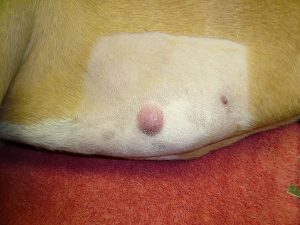
Characteristic Symptom: Skin lesions, lumps under the skin that vary in size and shape.
Dog Mammary Tumor
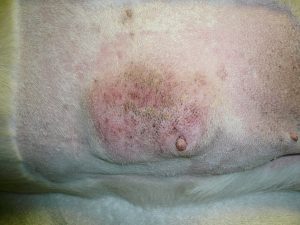
Characteristic Symptom: Lumps in the mammary glands, swelling around the mammary area, often in unspayed females.
Lymphoma
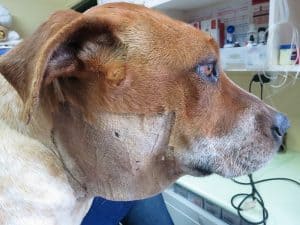
Characteristic Symptom: Large, hard lymph nodes, particularly around the jaw, in front of the shoulders, or behind the knees, lethargy, and loss of appetite.
Thyroid Cancer
This type of tumor originates from the cells of the thyroid gland. It can be detected by swelling under the skin but is often only discovered when signs of spread to other organs are evident. It is common in Golden Retrievers, Beagles, and Boxers.
Characteristic Symptom: Swelling in the neck, indicating thyroid enlargement, often detected in late stages.
Osteosarcoma

Characteristic Symptom: Severe pain, lameness, limb swelling, bone fractures.
Melanoma
Melanoma is a malignant tumor that arises from pigment-containing cells in the skin, known as melanocytes. These tumors can appear pink or unpigmented and may be flat or raised. In dogs, melanoma most commonly occurs in the oral cavity but can also be found in the eyes, nail beds, and skin. It is prevalent in breeds such as Schnauzers and Scottish Terriers.
Characteristic Symptom: Pigmented or pink lesions on the skin, most commonly in the oral cavity, but also in the eyes, nail beds, and skin.
Benign Dog Tumor Types
Benign tumors are clusters of cells that grow in a controlled manner and do not spread to other tissues or organs. These tumors typically do not pose significant health risks and rarely become life-threatening. Although they may require medical intervention, such as surgical removal, they do not show cancerous characteristics and do not form metastases. These tumors generally grow slowly and rarely cause pain or discomfort to the animals.
Histiocytoma
These benign tumors originate from histiocytes in the skin, which are immune system cells. They often regress and disappear on their own within a few weeks. They typically occur in dogs younger than two years old, particularly in breeds such as Labradors, Boxers, Shar Peis, Bulldogs, American Pit Bull Terriers, Staffordshire, and Scottish Terriers.
Characteristic Symptom: Small, round nodules on the skin surface, typically appearing in young dogs and often disappearing on their own.
Lipoma
Lipomas are benign tumors composed of fat cells found in the fatty layer beneath the skin. While they can sometimes appear alarming due to their size, they generally do not pose serious health risks. Breeds particularly prone to lipomas include Weimaraners, Dobermanns, German Shorthaired Pointers, English Springer Spaniels, and Labradors.
Characteristic Symptom: Soft, movable lumps under the skin, generally painless.
Papilloma
Caused by the papillomavirus, these warts usually disappear on their own. These benign tumors often spread among dogs through contact, especially in communal places like dog parks or daycares.
Characteristic Symptom: Small, wart-like growths, typically on the lips, tongue, throat, or gums, usually disappearing on their own.
When to See a Veterinarian?
Visible or palpable lumps, lethargy, loss of appetite, disinterest, diarrhea, vomiting, lameness, painful or bloody urination are all warning signs that require a veterinary examination. These symptoms may indicate a tumor, and the sooner the diagnosis is made, the better the chances of successful treatment.
Diagnosing and Treating Dog Tumor Types
Veterinarians determine the presence and type of tumor through physical examination, as well as laboratory and imaging tests. Diagnostic methods include blood tests, biopsies, ultrasound, X-rays, and CT scans. These tests help determine the tumor’s location, size, and type.
Treatment Options for Dog Tumor Types
Surgical Intervention: Removing the tumor surgically is one of the most common treatments, especially if the tumor is well-defined and has not metastasized. Surgery can be entirely curative if the tumor is completely removed.
Radiation Therapy: This treatment aims to destroy cancer cells and is often used when surgery is not possible or insufficient. Radiation therapy targets and destroys cancer cells while minimally damaging surrounding healthy tissues.
Chemotherapy: Chemotherapy treatments aim to stop the growth and spread of cancer cells. Although the side effects of chemotherapy in dogs may be milder than in humans, it is still important for the veterinarian to monitor the animal’s condition closely.
Immunotherapy: The goal of immunotherapy is to strengthen the animal’s immune system to fight cancer cells more effectively. This treatment method can be particularly useful for metastatic tumors.
The Role of Medicinal Mushrooms in Treating Dog Tumors
Medicinal mushrooms, such as reishi, maitake, shiitake, and cordyceps, are gaining increasing attention as a complementary treatment for cancer, regardless of the type of dog tumor. These mushrooms are natural immunomodulators that can help strengthen the immune system and fight cancer cells.
Reishi (Ganoderma lucidum)
This mushroom has strong antioxidant properties and supports immune system function. Studies suggest that reishi mushroom extracts can help slow tumor growth and reduce the side effects of chemotherapy.
Maitake (Grifola frondosa)
The maitake mushroom contains beta-glucans, which stimulate immune cells, particularly macrophages and natural killer cells. These cells play an important role in recognizing and destroying cancer cells.
Shiitake (Lentinula edodes)
The shiitake mushroom contains lentinan, an immunomodulating polysaccharide. Lentinan enhances the immune response and, according to research, can help combat cancer cells.
Cordyceps (Cordyceps sinensis)
This mushroom improves energy and oxygen utilization and supports the immune system. Cordyceps mushroom extracts may help inhibit the growth of cancer cells and strengthen the immune system.
If you want to know more, read our article about medicinal mushrooms.
The Curability of Dog Tumors
Certain types of dog tumors can be completely cured, especially if they are locally confined and can be surgically removed. Metastatic tumors are treatable but not always curable, making pain management and quality of life improvements essential.
The Role of the Veterinary Oncologist
When a tumor is diagnosed in a dog, consulting a veterinary oncologist helps determine the best treatment options and their expected effects on the animal’s quality of life and lifespan. The oncologist will thoroughly explain various treatment methods, including surgical interventions, radiation therapy, chemotherapy, immunotherapy, and the use of medicinal mushrooms.
Dog tumors present significant challenges for both animals and their owners. Early detection and appropriate treatment are crucial for successful recovery. In addition to conventional treatments, medicinal mushrooms play an important role in strengthening the immune system and fighting cancer cells. Regardless of the type of dog tumor, alternative treatment options are generally similar. Consulting with a veterinary oncologist and undergoing detailed diagnostic tests can help create the best treatment plan to ensure the highest possible quality of life for dogs with tumors.
Learn more about dog tumor types
Click here to read in Hungarian about the Kutya daganat típusok.
Or if you want to read in Hungarian about A kutya daganat és a gyógygomba összefüggéséről.
